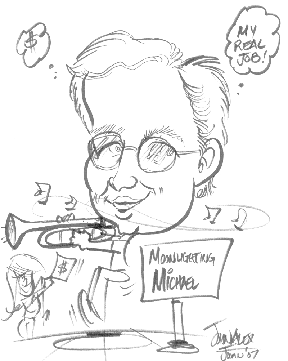Faculty and Leadership
Leadership

Creativity, design, (computational) analogy, sensemaking, collective intelligence, social computing, policy, cognitive science

privacy, data ethics, surveillance, security, digital literacy, design for children and families
Faculty

immersive media, narrative applications of data and technology, info and data visualizations, experimentation and collaboration, creative coding, prototyping, design systems and modularity

information quality, crisis informatics, online political discourse, unrest, social media

Design and evaluation of personal health and wellness technologies, ubiquitous computing, personal informatics

Cognitive science, meaning representation and cognitive processes in language, vision, and human computer interaction

Developing technology to support STEM learning and disposition for resource-constrained and minorities learners, participatory design with youth, young adults and communities.

natural language processing, fairness and bias in machine learning, human-centered AI

community based research, equity, equitable AI methods, HCI, equitable learning ecosystems, design

Mobile technologies, locative media, digital storytelling, cultural geography, gaming, and the history of technology.

Rotem Fishelson
Educational Technology, Data Science Education, Data Visualization, Learning Analytics, Creativity, Computational Thinking

Computer-supported cooperative work (CSCW), Computer-mediated communication (CMC), Human-centered computing (HCC), Multilingual and intercultural communication

Social Networks, trust, intelligent interfaces, emergency andrndisaster response systems

Educational technology, tablet-enhanced applications, ubiquitous computing, and creativity support tools.

Digital humanities, virtual worlds, intellectual property, image search and retrieval, new models of scholarly communication.

Studying and designing health technologies for disability and aging; understanding how technologies positions and support people with stigmatized conditions

Human-Computer Interaction, Digital Accessibility for People with Disabilities, Research Methods, User-centered design methods, Web Usability, Public Policy and Law related to HCI To enable screen reader support, press ⌘+Option+Z To learn about keyboard

Jing Liu
Developing, applying, and evaluating AI tools to support teachers and students in K-12 education

Zhicheng Liu
Information visualization, visual analytics, scalable visualization systems for interactive analysis, visualization authoring and design tools

CSCW, Social Computing, Sociotechnical Systems, Virtual Organizations, eScience and usable privacy & security

Human-centered security and privacy, secure software development, empirical methods

Exploring interaction techniques where people can communicate their embodied experiences to support each other in the fields of rehabilitation, education, and design
Susannah B. F. Paletz
teamwork, creativity, culture, diverse teams, AI in teams, applied social psychology (e.g., social media)

Technical HCI including interaction techniques, fabrication, wearables, human-robot interaction, design tools, AR/VR

Accessibility and Inclusive Design, Health Informatics, Human-Computer Interaction, Information Justice, Human Rights, and Technology Ethics, Machine Learning, AI, Computational Linguistics, and Information Retrieval, Youth Experience, Learning, and Digit

Educational technology, computer science education, computational thinking

game design for learning, online interactive lesson design, visualization

Susan Winter
The social and organizational challenges of data reuse and large-scale collaboration among scientists acting within highly institutionalized socio-technical systems

Uncertainty Communication; Information Visualization; AI for Decision-making; AI Literacy; Human-AI Interaction
Friends of the HCIL

Educational technologies, learning analytics, information visualization, and interaction strategies

Computer-assisted reporting, investigative journalism, overcoming barriers for access to public records, archives as resources for journalists, history of journalism and emerging media, history of information.

Design and analysis of systems at the intersection of economics, AI, and computer science

Information visualization, visual analytics, big data, novel interfaces, mobile devices, large displays, ubiquitous computing

Engineering design, online communities and crowdsourcing, design creativity, machine learning, computer-aided design and making

Technology and design methods for children, development of young children, lab schools, special education, early childhood education

Contextual Design and other user-centered design techniques, retaining women in high-tech companies, and games with a purpose

Information Law and Policy; E-government; Accessibility for Persons with Disabilities; Evaluation of Networked Information Systems; Social Theory and Information; Diversity and LIS Education

Digital humanities and new media, especially text visualization, text mining and text analysis, electronic literature and art, history of writing technologies, games.

Media studies, comics and the graphic novel, information design and graphic design, experimental literature, science fiction across media.

Design Theory & Methodology, Collaborative Design, Human-Computer Interaction, Information Visualization

Interactive information retrieval, esp. for spoken word materials, conversational text, and multilingual applications. User modeling, implicit feedback. Archival access to electronic records.

Intelligent transportation systems, operations research, open data, serious games, incident and emergency management, information visualization, user interface design, traveler information, and big data

behavior change, affective computing, stress, productivity, design, human-centered AI

(Emerita) User interface design and evaluation, information visualization, evaluation methods, and public access

Citizen Science, informal science education, computer-mediated communication, human-computer interaction, online communities, motivation for participation in social media

Information visualization and digital libraries with an emphasis on service oriented projects.

Information visualization, user interface design, human-computer interaction theories, empirical methods, universal usability.

Professor of English and Founding Director, Maryland Institute for Technology in the Humanities (MITH), Executive Editor, Dickinson Electronic Archives projects; electronic and social editing; gender and ethnometh

Design and human disability and aging, usability, accessibility, inclusive design, Global Public Inclusive Infrastructure (GPII)

The teaching and learning of algebra in formal and informal environments, natural algebraic resources, proto-algebraic reasoning, early informal algebra










